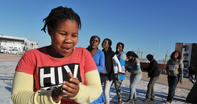In the early 2000’s, the Treatment Action Campaign (TAC) played a pivotal role in ensuring that pregnant South African women, who were HIV-positive, received a drug named nevirapine, which could help prevent HIV transmission through birth. TAC won the case, helping thousands of HIV-positive mothers give birth to healthy, HIV-negative babies. The ruling saved many lives and continues to do so 16 years later as HIV-positive mothers are still eligible to receive the drug.

TAC Goes to Court
The Treatment Action Campaign (TAC), headed by activist Zackie Achmat, took the government to court in 2002 as the need for access to a treatment programme that would slash the number of babies who contract HIV from their mothers, arose.
The action, filed in the Pretoria High Court, demanded that the state make nevirapine, a registered drug, available to HIV-positive women who had their babies in public clinics and hospitals, to reduce the transmission of HIV. Another demand was that the state implement a clear policy for treatment that would include counselling and testing and antiretroviral therapy.
Demand for Change

The court case ran through 2002, at the height of the Aids epidemic in South Africa. At the time, tensions were running high between those (like TAC) who demanded a better Aids healthcare programme and the then-minister of health, Manto Tshabalala-Msimang, who was mum on the subject.
The bitter dispute between TAC and the government led to a fiery court case, which ultimately had a life-changing outcome. The court’s decision was to uphold the constitutional right of all citizens to access health care, making services available to HIV-positive pregnant women that would prevent mother-to-child transmission of HIV. This verdict saved the lives of thousands of children who would have lived short, miserable lives.
The win was instrumental in ensuring that HIV-positive South Africans receive the healthcare they needed. TAC’s activism ushered in a new era in the response to HIV in South Africa. After the verdict in 2003, the Department of Health included mother-to-child transmission prevention programmes in their budgets.
Later that year, the cabinet approved a national ARV programme and in early 2004, the public health system began rolling out treatment to people with Aids. Today, all HIV-positive mothers are able to access the much-needed medication to prevent their children from contracting the life-threatening disease.